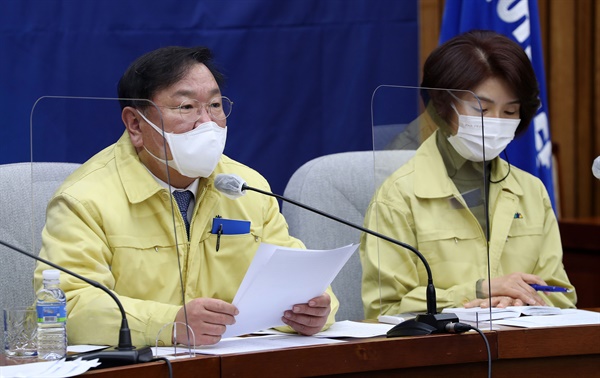 |
|
| ▲ In addition, Democratic Party leader Kim Tae-nyeon speaks at the in-hospital countermeasures meeting held at the National Assembly in Yeouido, Seoul on the morning of the 29th. | |
| Ⓒ Yonhap News |
See related photos |
“A politician who has even run for president must have an objectivity based on facts in order to make a review, and in order to conduct a political offensive, it must have a future-oriented ability to present alternatives.”
This is a statement by Kim Tae-nyeon, the leader of the Democratic Party, to former lawmaker Yoo Seung-min, the next president of the people’s power. It was a rebuttal to Rep. Yoo’s claim that the previous day (28th) on his Facebook page, “Because of the Moon Jae-in administration, the poor (basic living recipients + second-class people) increased rapidly.”
In this article, Rep. Yoo specifically stated, “The number of poverty in the Park Geun-hye administration increased by 180,000 during the four years and two months of the Park Geun-hye administration, while the number of people in poverty increased by 560,000 during the three years and six months of the Moon Jae-in administration. “The fact that the number of the poor population tripled in the Moon Jae-in administration than in the Park Geun-hye administration is evidence that the polarization has worsened.”
However, at the meeting for countermeasures in the hospital that day, Kim Won-nae replied that Rep. Yoo’s argument was “a malicious distortion of facts and a distortion of statistics.” It was argued that the increase in the number of basic living recipients and the second-class people was due to the Moon Jae-in administration’s efforts to expand the social safety net and eliminate welfare blind spots, such as gradually abolishing the standards for those who are obligated to support livelihood benefits, and not because of the increase in the poor due to intensifying polarization.
In response, Won Nae Kim said, “As of 2015, the number of non-supply and poor people who were poor but who did not receive government support reached 930,000. “The number of people receiving support is constantly increasing.”
“For example, as the standard for people obligated to support housing benefits in the basic living security system was abolished, the number of new basic living recipients reached 710,000,” he said. “Ignoring the effects of these system improvements, it was reported that the poor simply increased. He criticized Gokhak-Ase, who distorts the facts and misleads public opinion.
“Yoo Seung-min, politically criticized for increasing the number of beneficiaries by improving the system in the direction I said…”
In particular, Won Nae Kim also criticized that Congressman Yoo Jeon, who proclaimed the “abolishment of the criteria for obligated dependents” as the first welfare pledge at the time of the 2017 presidential election, ignored the changes caused by the policy effects of his pledge and launched a political offensive.
In this regard, Won Nae Kim said, “A politician under the power of the people claimed that’the poor population in the Moon Jae-in administration has rapidly increased and polarization has intensified.’ In the last presidential election, he made a pledge to abolish the standards for obligated dependents. He pointed out that there are 1 million people in poverty who cannot benefit from the Basic Livelihood Security System because of mandatory standards.”
He continued, “I am very sorry for the political behavior of accusing the government that’the polarization has intensified’ over the increase of welfare beneficiaries due to the improvement of the system in the direction that I said. “The person who introduces himself as an economic expert You may not be aware of the economic indicators that determine inequality. According to the recent announcement by the National Statistical Office, the Gini coefficient, the quintile multiplier, and the relative poverty rate are all improving, he stressed.
In addition, he added, “A seditious politics that only excretes anger for its own political position may receive’shining’ attention from the media, but it cannot receive public support,” he added. “I hope you look back on what is the correct attitude for politics.” .
On the other hand, the system for obligated support is a system that prevents people from receiving benefits if they have immediate family members such as parents and children even if their property or income meets the criteria for selecting recipients of basic living security. However, this has been pointed out as a system that threatens the livelihood of the poor who are only family members on paper and have no exchange or the ability to support each other. Accordingly, the Moon Jae-in administration has made the abolition of the standard for obligated dependents a national task, and is pursuing a direction to phase out the standard for obligated support for livelihoods by 2022.
